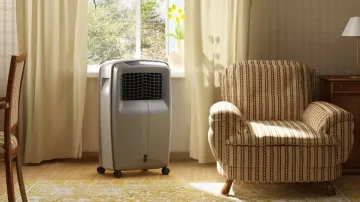It's monsoon season in most of India, and heavy rains are causing discomfort when running a cooler. The cooler's operation during this time increases humidity and makes the room feel sticky. To address this issue, here are some simple ways to reduce the humidity caused by the cooler:
- Use an exhaust fan: Installing an exhaust fan in the room alongside the cooler can effectively remove the excess moisture, providing relief from humidity while keeping the atmosphere cool.
- Maintain ventilation: Ensure the room is not completely sealed during rainy days. Opening the window while the cooler is in use allows for proper ventilation, preventing the buildup of moisture.
- Keep the cooler outside the room: Placing the cooler outside the room allows it to draw in fresh air, reducing the amount of humid air used for cooling and minimising the rapid increase of humidity and stickiness indoors.
By following these tips, you can enjoy the cool air from the cooler without the discomfort of excessive humidity.
Meanwhile, refrigerators can become a potential fire hazard in extreme temperatures. It's crucial to adopt safety measures while using refrigerators to prevent dangerous mishaps.
- Overheating is the main reason for fires in electronic devices/appliances like ACs and refrigerators. The heat released by the refrigerator can lead to a fire, so it's important to place the refrigerator in a well-ventilated area to prevent overheating.
- Voltage fluctuation is common during the summer due to high electricity demand. Using a high-voltage stabilizer is necessary to protect the fridge from catching fire due to voltage fluctuation.
- Regular maintenance is essential for refrigerators, just like ACs. This includes cleaning the compressor, filters, vents, and other components to prevent leakage or overheating problems.
- Using the defrost button regularly to clean the ice formed in the fridge can extend the life of your refrigerator.
It's important to remember that the refrigerator's compressor contains flammable gases, so taking precautions against fire hazards is necessary.
ALSO READ: How many years can we use a Window or Split AC? Here's their expiry date
